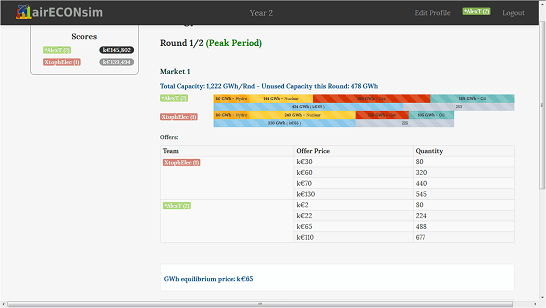
The game interface.
Players are responsible for managing the fleet of electric power producers competing over the same markets. They must sell their energy on a wholesale market over several -peak or off-peak- periods, and organize their production to meet demand. The game environment is changing every year: Players have to constantly adapt their strategy and anticipate changes in the behavior of their competitors (crises, distribution network constraints, introduction of technologies' technical characteristics, mergers, emergence of environmental constraints, new technologies, cost evolutions, R&D...).
Some of our customers: Toulouse School of Economics, HEC Paris Executive MBA, Maersk, Paris Dauphine University, AgroParisTech, University of Lille, Sciences Po, Toulouse Business School, ENAC, IMT Atlantique, ENSAI, Mines-Albi, MOOC "Manage Your Prices", University Rennes 1, Ecole des Ponts ParisTech, Master EDDEE, Purpan, Ecole Polytechnique...
With the Energy Game, players understand through practice, the major issues of electricity economics:
Theoretic debriefing phases regularly occur during the game, to help players apply economic analysis tools to decision making.
We regularly offer (distance or traditional) trainings on energy economics or industrial organization, for all levels. The usual duration of training on energy economics is two days for a standard scenario, in French or English.
Upon request, we also organize tailored interventions, over three, four or five days, using specific scenarios and/or our other games: